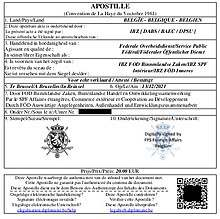Comprehending the Apostille Refine: A Comprehensive Guide to International Paper Verification
Navigating the detailed landscape of international record verification can be daunting without a clear understanding of the apostille procedure. This guide diligently details the required actions, from recognizing which documents need certification to submitting them for verification by the Competent Authority. Realizing the significance of an apostille and identifying prospective challenges, such as incomplete entries and language barriers, can significantly simplify the verification journey. What specifically defines an apostille, and why is it so vital for files predestined for Hague Convention nations? These questions create the structure of our expedition right into this necessary legal treatment.
What Is an Apostille?
An apostille is a main accreditation that validates the authenticity of a document for usage in an additional nation. This accreditation, provided by a designated authority in the nation where the paper came from, guarantees that the file is recognized as legitimate and legit in the worldwide field. The process of obtaining an apostille entails numerous steps, including the confirmation of the record's signatures, seals, and stamps by suitable governmental bodies.
The apostille functions as an internationally recognized kind of verification, made possible by the Hague Convention of 1961. This treaty, officially called the Hague Convention Abolishing the Requirement of Legalisation for Foreign Public Records, standardizes the process of paper accreditation among participant nations. The apostille itself is a standardized certification that consists of particular details, such as the providing authority, the nation of origin, and the date of issuance.
It is very important to note that not all files are eligible for an apostille. Typically, public papers like copyright, marital relationship licenses, court orders, and educational diplomas get approved for this accreditation. Exclusive papers, such as agreements and contracts, might require registration and additional steps to certify.
Value of Apostille
Recognizing what an apostille is sets the phase for appreciating its importance in global transactions. houston tx apostille. An apostille, basically a form of accreditation issued by an assigned authority, confirms the authenticity of a paper for use in foreign nations that are signatories to the Hague Apostille Convention. This standardized procedure eliminates the requirement for more legalization by embassies or consular offices, therefore streamlining worldwide purchases
It makes certain the credibility and acceptance of important files-- such as copyright, marriage licenses, and educational diplomas-- across borders. For companies, it helps with the smooth conduct of worldwide trade, mergers, and acquisitions by providing a relied on approach of record confirmation.
In addition, an apostille boosts lawful safety and conformity. Governments and organizations can with confidence count on the credibility of documents bearing an apostille, alleviating the risk of fraudulence and misrepresentation. Thus, the apostille works as a vital tool in advertising international teamwork and count on. Its role in cultivating effective and protected international purchases highlights its essential worth in today's interconnected world.
Papers That Require Apostille
When engaging in global transactions or lawful issues, specific papers often require the verification provided by an apostille. This guarantees their acknowledgment and acceptance in nations that are signatures to the Hague Apostille Convention. Typically, individual records such as copyright, marriage certifications, and death certificates need an apostille, particularly when they are made use of for processes like immigration, marital relationship abroad, or global probate issues.
Educational documents are another classification often calling for apostilles. Diplomas, records, and academic records typically require this verification for objectives such as pursuing further education, employment, or expert licensing in a foreign country (houston tx apostille). This step ensures that the papers are identified as reputable and legitimate
Lawful records, consisting of powers of lawyer, affidavits, and court orders, also typically require apostilles. Company files such as certifications of incorporation, laws, and business agreements may call for an apostille to help with worldwide profession, develop foreign branches, or participate in cross-border legal proceedings.
Actions to Get an Apostille

Obtaining an apostille involves a multi-step process that ensures the authenticity and approval of your records in international countries. The preliminary step is identifying which records require you could try this out an apostille. houston tx apostille. Typical files include copyright, marital relationship licenses, academic transcripts, and corporate records
As soon as determined, the file should be certified by the ideal providing authority. This might involve registration by a notary public or verification by a regional or state official, relying on the kind of file. After certification, the record should be sent to the marked Competent Authority in the record's nation of beginning. In the United States, for instance, this is normally the Secretary of State's office for each state.
The submission procedure usually calls for a completed application, the original record, and a charge. Some jurisdictions may supply the choice of expedited processing for an added fee. Upon successful verification, the Competent Authority will affix the he has a good point apostille certification to the paper, consequently confirming its authenticity.
Usual Challenges and Solutions
Navigating the apostille procedure can offer numerous usual challenges that, if not correctly attended to, might postpone or make complex record verification. Each nation has specific requirements for the types of documents that can be apostilled, and any deviation from these can result in rejection.
Another common challenge is understanding the varied processing times. Processing times can differ significantly between nations and also in between various areas within the exact same country. It is crucial to make up these variants when preparing the apostille process to prevent unexpected delays.
Furthermore, language barriers can position significant barriers. Records in an international language commonly need certified translations, and any errors in translation can bring about additional issues. Engaging find out here now a specialist translation solution can reduce this risk.

Final Thought
Mastering the apostille procedure considerably enhances the efficiency of global file verification. By comprehending the need of identifying and licensing required papers, and navigating the submission to the Competent Authority, the procedure becomes a lot more manageable.